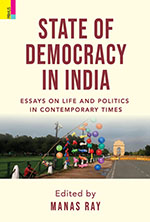The books under review are actually two accompanying volumes with forty contributors, the genesis of which lies in an issue of the journal Seminar that Manas Ray had edited in October 2015. Both these volumes engage with the concept of democracy in an unconventional manner. They take the reader beyond the realm of a traditional understanding where the concept and idea of a democracy is mostly perceived and discussed as a ‘political system’ with a written Constitution, accompanied by periodical elections, an independent judiciary with rule of law, and a political party system. Rather, the volumes adopt a lens that juxtaposes modernities of various kinds and make the reader look at democracy as a force for new imaginations, which in turn affect the more formal understanding of the concept of democracy as a process.
The essays in both the volumes speak to each other and read like a continuous narrative around the issues of democracy as lived and experienced through the prism of intersectionality in everyday life. For instance, while dwelling on the concept of ‘deliberative democracy’, which means
‘…equal liberties under laws reached through a reasonable deliberation’, the essays in the volumes bring up key questions like, is it possible to ensure ‘equal liberties’ and related institutional protocols in the face of entrenched discrimination and all-pervasive economic inequality? The pages of the volumes also expose the reader to the alarming rate at which the levels of violence and corruption are increasing in India, and how the government invests most of its energy in ‘contingency management to keep a restive populace pacified’ while there is a ‘surplus, floating crowd of the jobless in postcolonial neoliberalism’ that make for the cadre strength of political parties (p. 20).

